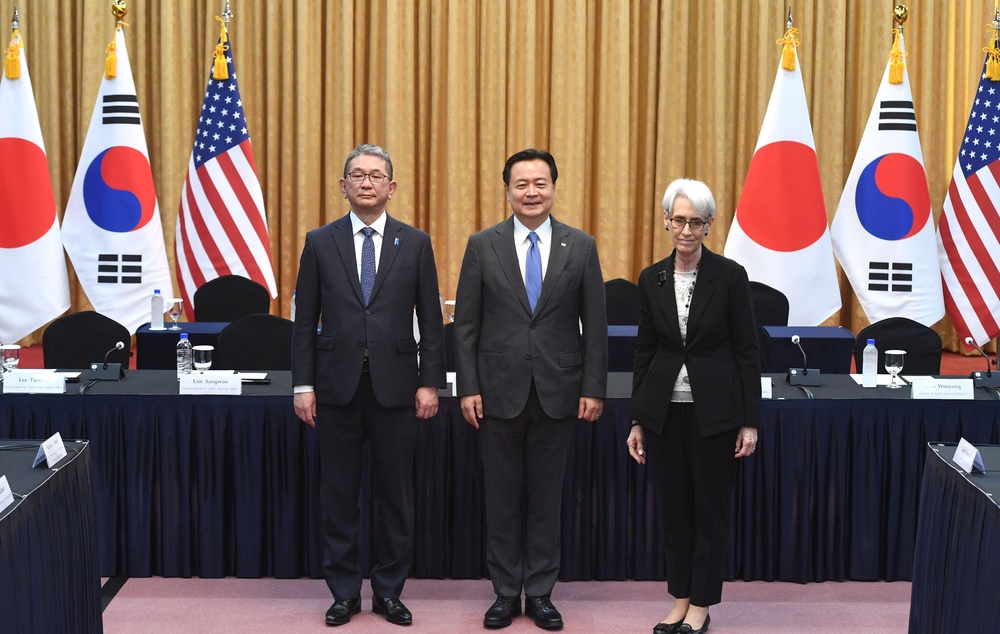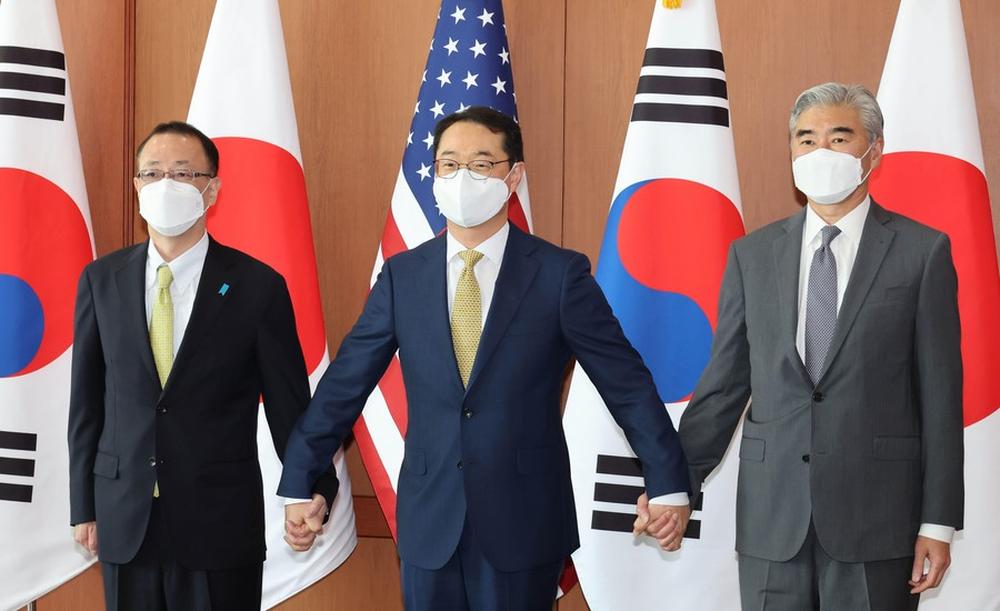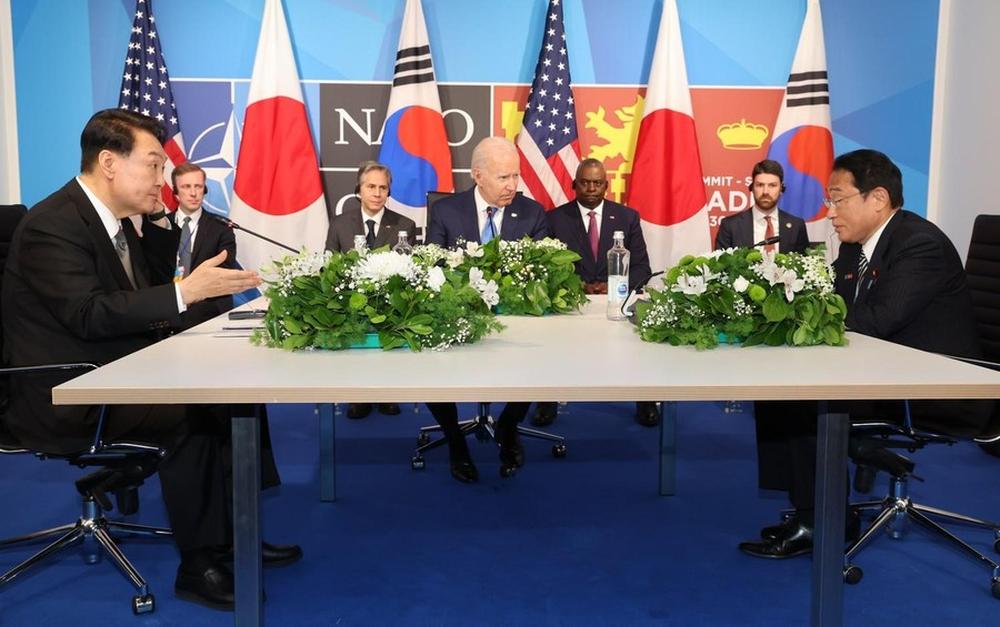- #Japan
- #South Korea

► While there has been some progress in trilateral cooperation in recent years, backed by strong support from the US, considering the deterioration of ROK-Japan relations, the transformation of bilateral relations will not be as easy as the US expected.
► In recent years, it has become more difficult to repair ROK-Japan relations because issues originating from historical injustices have become closely linked to economic issues like trade retaliation and even security issues.
► Therefore, rather than hastily pursuing trilateral military and security cooperation, the US should approach this situation by acknowledging the differing strategic perspectives of Korea and Japan regarding the goals and scope of trilateral security cooperation.
Since around 2020, the international order has been experiencing a transition. This is due to China’s faster-than-expected rise in the 21st century, which made the decline of the US, the leader of the international order throughout the 20th century, appear to accelerate. Moving away from the passive discourse of the past, China has adopted an “active defense” strategy and declared that they will openly discuss a “new type of major power relationship” with the US. Meanwhile, a series of political decisions made during the Trump administration – increasing the security burden placed on allies and withdrawing from the Trans-Pacific Partnership, Paris Agreement, and Intermediate-Range Nuclear Forces Treaty – further facilitated the decline of the liberal international order. On top of that, the COVID-19 pandemic swept across the globe, triggering border closures and a shift in international politics towards nationalism and factionalism, which led to growing concerns about the emergence of a new Cold War.
Amid this confrontational international political structure, new administrations took office in Korea, Japan, and the United States, adopting somewhat different diplomacy policies than previous administrations. In particular, according to US President Biden’s intentions to promote trilateral cooperation between Korea, Japan, and the US, there is currently a possibility of military and security cooperation in Northeast Asia. President Biden, who took office in 2021, is focusing diplomatic efforts on restoring America’s global leadership, which was undermined by the previous administration’s America First strategy. With a foreign policy focused on restoring and strengthening traditional alliances, the US is developing minilaterals based on existing alliances with Korea, Japan, Australia, and NATO. These include the Quad, a quadrilateral security dialogue with the US, Japan, India, and Australia and AUKUS, a trilateral security pact with the US, the UK, and Australia. Through this alliance policy, the US is aiming to emphasize cooperation with allies and partners that share democratic values, such as freedom, human rights, and the rule of law, while expanding a bloc based on values and ideology. Moreover, the “Indo-Pacific Strategy of the United States” released by the Biden administration on February 11, 2022, emphasizes joint response with treaty allies and partners in the Indo-Pacific region, including Korea, Australia, Japan, the Philippines, and Thailand. The US has demonstrated its desire to support their allies in strengthening their own individual roles in the region by emphasizing mutual cooperation between allies in the US alliance network.
In the same context, the Biden administration has consistently emphasized the importance of trilateral cooperation between Korea, the US, and Japan since its inception. The “Indo-Pacific Strategy of the United States” published in 2022 specifies the need to strengthen ROK-Japan relations, and the 7th of 10 Action Plan items is to expand US-Japan-ROK cooperation. Meanwhile, the US Congress’ adoption of three resolutions that reaffirm the importance of trilateral cooperation in the past three years is something that cannot be ignored. In April 2019, the US Senate adopted a resolution reaffirming the importance of close ties and cooperation between Korea, the US, and Japan, and the House adopted the same resolution in September of that year. A resolution urging the Korean government to change its decision in order to maintain the General Security of Military Information Agreement (GSOMIA) was also swiftly adopted. Referencing North Korea’s missile provocations in 2019, the Senate’s resolution emphasized that given the current situation, “the suspension of GSOMIA directly harms United States national security.” This statement shows that the US recognizes that cooperation between Korea, the US, and Japan is a diplomacy strategy directly related to the national interests of the United States.
With this push from the United States, on February 12, 2022, an ROK-US foreign ministerial meeting and an ROK-Japan foreign ministerial meeting were held in Hawaii, along with a trilateral ministerial meeting. Due to strained ROK-Japan relations, a ministerial meeting between the three countries had not taken place since February 2017, but with the support of the US, a trilateral meeting was held for the first time in five years, concluding with a joint statement. In the statement, the three countries committed to “expand cooperation and collaboration across a range of regional and global security and economic priorities,” and reaffirmed their commitment to “US-ROK-Japan trilateral cooperation that is grounded in shared values and desire for regional peace, stability, and prosperity...[and] to continue regular trilateral ministerial consultations.”
While there has been some progress in trilateral cooperation in recent years backed by strong support from the US, considering the deterioration of ROK-Japan relations, the transformation of bilateral relations will not be as easy as the US expected. The history of Japanese colonization and crimes against humanity committed by Japan during that period have become a national trauma that is deeply embedded in Korean society. Moreover, Japan’s viewpoint that they have fully apologized and compensated for their past wrongdoings being in sharp contrast with Korea’s viewpoint that Japan has yet to properly apologize is a constant source of conflict between the two nations. Mutual distrust and anxiety linger because the scars of the past have not healed and are still influencing the present.
From the perspective of national trauma, the two most serious issues for ROK-Japan relations are the “comfort women” issue and the supreme court ruling on forced labor. In 2015, Korea and Japan attempted to complete the “final” resolution of the “comfort women” issue with the Korea-Japan “Comfort Women” Agreement, but the agreement was largely ineffective due to opposition from the victims, criticisms of procedural justice, and deteriorating public opinion. In particular, the failure to implement a victim-centered approach during the settlement process triggered considerable criticism domestically. Meanwhile, the Supreme Court’s ruling on the forced labor issue in 2017 was followed by a series of incidents, including Japanese trade retaliation such as excluding Korea from its “whitelist” and the threatening flight of a military patrol plane. In addition, the General Security of Military Information Agreement (GSOMIA) issue has not yet been resolved due to Korean society’s strong rejection to the sharing of military information with Japan.
In recent years, it has become more difficult to repair ROK-Japan relations because issues originating from historical injustices have become closely linked to economic issues like trade retaliation and even security issues. This is a notable change considering the unique dynamism of Northeast Asia in the past. Previously, despite tense historical disputes between Korea and Japan, the two countries were still able to engage in seamless economic cooperation. It was for this reason that terms such as “Cold Politics-Hot Economics (政冷經熱)” and “Asia Paradox” emerged. In other words, a two-track diplomacy strategy was used that approached sensitive historical issues and economic cooperation separately. However, since 2018, ROK-Japan relations have encountered numerous issues where history, diplomacy, economy, and security are all intertwined. The historical conflict between the two countries dominates the domains of diplomacy, justice, and politics, and it is an ongoing aspect of the bilateral relationship.
The United States also recognizes the severity of the historical conflict between Korea and Japan. For example, the US perceives that trilateral cooperation was undermined by the deterioration of relations between the two US allies during Abe’s time as prime minister. However, the role the US is willing to play as a third-party in addressing historical conflicts between Korea and Japan appears to be limited. While emphasizing the importance of improving ROK-Japan relations, a US official stated, “The United States is less secure when Japan, Republic of Korea are not cooperating,” and the US also thinks that it is not appropriate to directly mediate in order to improve bilateral relations. The position of the US is that the two countries should be able to improve relations by themselves. This position likely stems from the Obama administration’s experience being involved in the Korea-Japan 'Comfort Women' Agreement and “failing” to successfully mediate between the two countries.
Considering past lessons and the current tension between Korea and Japan, it is unlikely that ROK-US-Japan cooperation will be able to reach the level of trilateral cooperation desired by the US in the foreseeable future. This is because the mutual distrust and perceived threat resulting from historical issues between Korea and Japan must be fundamentally addressed before institutionalized military and security cooperation will be possible. Therefore, rather than hastily pursuing trilateral military and security cooperation, the US should approach this situation by acknowledging the differing strategic perspectives of Korea and Japan regarding the goals and scope of trilateral security cooperation. Considering the current issues in ROK-Japan relations and public sentiment, it will not be an easy task to implement high-level military cooperation right away. Therefore, restoring previous national defense cooperation and pursuing trilateral cooperation in non-traditional security areas could help open channels of communication to naturally discuss the issues between Korea and Japan. This is because it may help reduce domestic resistance stemming from ROK-Japan relations and alleviate the concerns of neighboring countries, particularly China. An approach that gradually expands the agenda and scope of cooperation will have the benefit of reducing expected domestic backlash in Korea and Japan and freeing up space to persuade China.
Finally, since the assassination of former Prime Minister Abe can be expected to trigger a conservative shift in Japanese society, the domestic political situations of Korea and Japan cannot be ignored. The Korean government must recognize that the ROK-US-Japan trilateral cooperation mechanism contributes to the stability of the regional order in Northeast Asia and keep an open mind to openly discussing the cooperation agenda. At the same time, the Japanese government should be more supportive of ROK-Japan efforts to restore trust and be willing to diversify its North Korea policy, which is currently solely focused on the abduction of Japanese citizens by North Korea.
Jahyun Chun is an associate professor in the department of international relations at Yonsei University, Mirae Campus. Chun’s research interests include international reconciliation and foreign policy in East Asia. Her publications include “Varieties of International Reconciliation,” International Relations(2022), and “Who Decides Foreign Policy? The Role of National Trauma in Shaping the Influence of Public Opinion in South Korea,” Policy Studies (2021).

